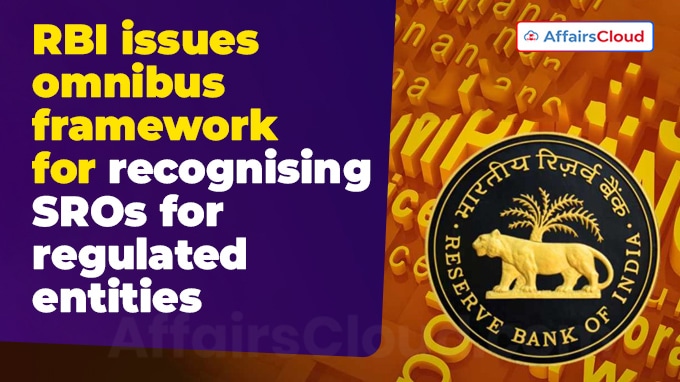 On March 21, 2024, the Reserve Bank of India (RBI) finalized the ‘Omnibus Framework for recognising Self-Regulatory Organisations (SRO) for Regulated Entities (REs) of RBI’. The framework sets general standards like objectives, responsibilities, eligibility, governance, and application procedures for all recognized SROs by RBI.
On March 21, 2024, the Reserve Bank of India (RBI) finalized the ‘Omnibus Framework for recognising Self-Regulatory Organisations (SRO) for Regulated Entities (REs) of RBI’. The framework sets general standards like objectives, responsibilities, eligibility, governance, and application procedures for all recognized SROs by RBI.
- Specific guidelines related to number of SROs and membership will be provided separately by relevant Reserve Bank departments for each sectoral SRO.
- Existing SROs already recognized by the RBI will continue to be governed by the terms and conditions under which they were recognized, unless this framework is specifically extended to such SROs.
Background:
i.The need to develop better industry standards for self-regulation raised to the growth of REs like banks, NBFCs, and fintechs, in terms of number, scale of operations, increase in adoption of innovative technologies and enhanced customer outreach.
ii.SROs enhance regulatory effectiveness by leveraging practitioner expertise and refining regulatory policies with insights on technical nuances and practical trade-offs.
iii.As per the announcement made in the Statement on Developmental and Regulatory Policies of the Reserve Bank, as part of its Monetary Policy Statement in October 2023, a draft framework titled ‘Draft Omnibus Framework for recognising Self-Regulatory Organisations for its Regulated Entities’ was issued for public comments on December 21, 2023.
- Now, each sector of the REs will have separate SRO and with the finalization of the framework the RBI will receive applications from various entities seeking to get SRO status.
About SROs:
i.Enhancing Regulation: SROs utilize practitioner expertise to improve regulations and advise on technical aspects, fostering innovation and fair competition.
ii.Policy Influence: They contribute to policy refinement, promoting transparency and consumer protection.
iii.Complementary Role: SROs complement existing regulations for better compliance.
iv.Establishing Standards: They develop voluntary best practices within RBI’s framework without replacing regulatory requirements for REs.
Highlights from framework:
i.SROs have to submit annual report to the RBI within 3 months of completion of the accounting year.
ii.The SRO, which will be structured as a not-for-profit company registered under Section 8 of the Companies Act, 2013, will also submit periodic/ ad hoc returns as may be prescribed by RBI.
iii.RBI, if necessary, inspect the books of the SRO or arrange to have the books inspected by an audit firm.
iv.RBI can also revoke the recognition granted to an SRO, if its functioning to be detrimental to public interest or any other stakeholder.
v.The SRO must operate transparently, professionally, and independently to instill sector confidence.
vi.Compliance with high governance standards and professional management is essential.
vii.Directors must meet ongoing ‘fit and proper’ criteria and possess relevant expertise and integrity.
viii.At least one-third of the Board, including the chairperson, must be independent, with prompt reporting of any changes or adverse information about Directors to the RBI.
ix.The SRO must have skilled human resources and robust technical capabilities, ensuring transparent governance processes.
RBI orders Agency Banks to facilitate Government transactions on March 31
In response to a request from the Government of India (GoI), the RBI will keep all branches of banks handling government transactions open on March 31, 2024 (Sunday) to ensure all transactions for the fiscal year 2023-2024 (FY24) are accounted for.
- In this regard, Agency Banks are instructed to keep their government business branches open on this day to facilitate these operations, as March 31 falls on a Sunday in 2024.
Note: As of May 2023, there are 33 agency banks in India which are authorized for government operations pertaining to receipts and payments.
Click here for the complete list of Agency banks in India
RBI extends deadline for submission of entries for Financial Literacy Ideathon
The RBI announced a Financial Literacy Ideathon for postgraduate students on February 26, 2024, originally with a submission deadline of March 20, 2024. Responding to extension requests, the RBI extends the submission deadline to April 15, 2024.
- To ensure consistency, submissions must be typed and can be sent online or by post, accompanied by the respective college/institution’s ID card.
- Extending the timeline aims to encourage more active student participation in addressing financial literacy challenges.
Recent Related News:
i.As of February 6, 2024, the RBI has granted final approval to two fintech startups namely Juspay Technologies Private Limited (Juspay) and Decfin Tech Private Limited (Decfin) and a Software- as-a-Service(SaaS) provider Zoho Payment Technologies Private Limited (Zoho) to act as a Payment Aggregator (PA).
ii.On February 9, 2024, the Reserve Bank of India (RBI), in exercise of powers conferred by Section 35B of the Banking Regulation (BR) Act, 1949, has increased the remuneration ceiling of Non Executive Directors (NEDs) of banks from Rs 20 lakh per annum to Rs 30 lakh with immediate effect.
About Reserve Bank of India (RBI):
Governor – Shaktikanta Das
Deputy Governors – Swaminathan Janakiraman, Michael Debabrata Patra, M. Rajeshwar Rao, T. Rabi Sankar
Establishment– 1st April 1935
Headquarters– Mumbai, Maharashtra




